Role of a Wedding Hostess

A wedding hostess is a key part of a wedding event. She needs to make sure the day runs smoothly and the couple and their guests have an enjoyable experience. Her duties include:
- Collecting and transporting gifts from guests.
- Managing the guest book.
- Greeting guests and directing them to their seats.
To be a good wedding hostess, one needs to have excellent communication skills, be organized, and pay attention to detail.
Before the wedding, the hostess helps with pre-wedding festivities, such as bridal showers and bachelor/bachelorette parties. She also assists with the rehearsal dinner by setting up decorations and coordinating with vendors.
On the day of the wedding, the hostess welcomes guests and answers their questions. She also helps set up and serve during cocktail hour and dinner. She encourages conversation throughout the celebration.
Afterwards, she cleans up any decorations and equipment. Plus, she helps with final guest departures and makes sure all items are returned to the right owners.
A wedding hostess should dress appropriately for the wedding. How many hostesses are needed depends on the size and tasks of the wedding.
A wedding hostess is vital for a successful wedding. With their tasks, professionalism, and attention to detail, they make the event special.
Responsibilities of a Wedding Hostess
Wedding hostesses play a crucial role in ensuring a seamless and memorable event. In this section, we will explore the responsibilities that fall under their purview. From collecting and transporting gifts to managing the guest book and assisting with the reception, we'll uncover the essential tasks and contributions that wedding hostesses make behind the scenes. So let's dive in and discover the key roles that these dedicated individuals fulfill to make weddings truly special.
Collecting and Transporting Gifts
The wedding hostess has the responsibility of collecting and transporting gifts. This requires attention to detail and organization!
- Greet guests warmly and offer assistance in carrying gifts.
- Label each gift with the name of the guest.
- Transport gifts to a secure area, like a separate room or gift table.
It's also important to maintain confidentiality regarding the gifts. Respect the privacy of both givers and recipients. By managing this job well, the hostess ensures a positive experience for all. Gifts won't be unnoticed or unappreciated!
Managing the Guest Book
The Wedding Hostess ensures the guest book is visible for all to see. They place it in a noticeable spot to encourage guests to write their well-wishes. They help guests find the book and give instructions too. After the wedding, the Hostess collects the entries and puts them in a neat presentable way. That might be transcribing messages into digital or creating a physical scrapbook. The Hostess must pay attention to detail. Ensure guests sign their names and other info. By managing the book efficiently, they help create a lasting memory for the couple. Pro Tip: To increase efficiency, have backup pens and extra pages ready for unexpected high participation.
Assisting with the Reception
A wedding hostess must have charm, organization, and the willingness to act like they care about seating arrangements to assist with the reception.
Firstly, coordinate with the catering staff to check settings, arrange seating, and make sure there are enough supplies.
Secondly, welcome guests and direct them to their table. Be ready to answer questions and address concerns.
Thirdly, serve food promptly and efficiently, help with dietary requirements and allergies, and ensure glasses are full.
Lastly, resolve any issues or conflicts, like noise complaints, guest disagreements, or schedule changes.
Assist with the reception with detail and great communication skills. Be friendly and approachable to create a warm atmosphere. A skilled wedding hostess is essential for a couple's special day going off without a hitch.
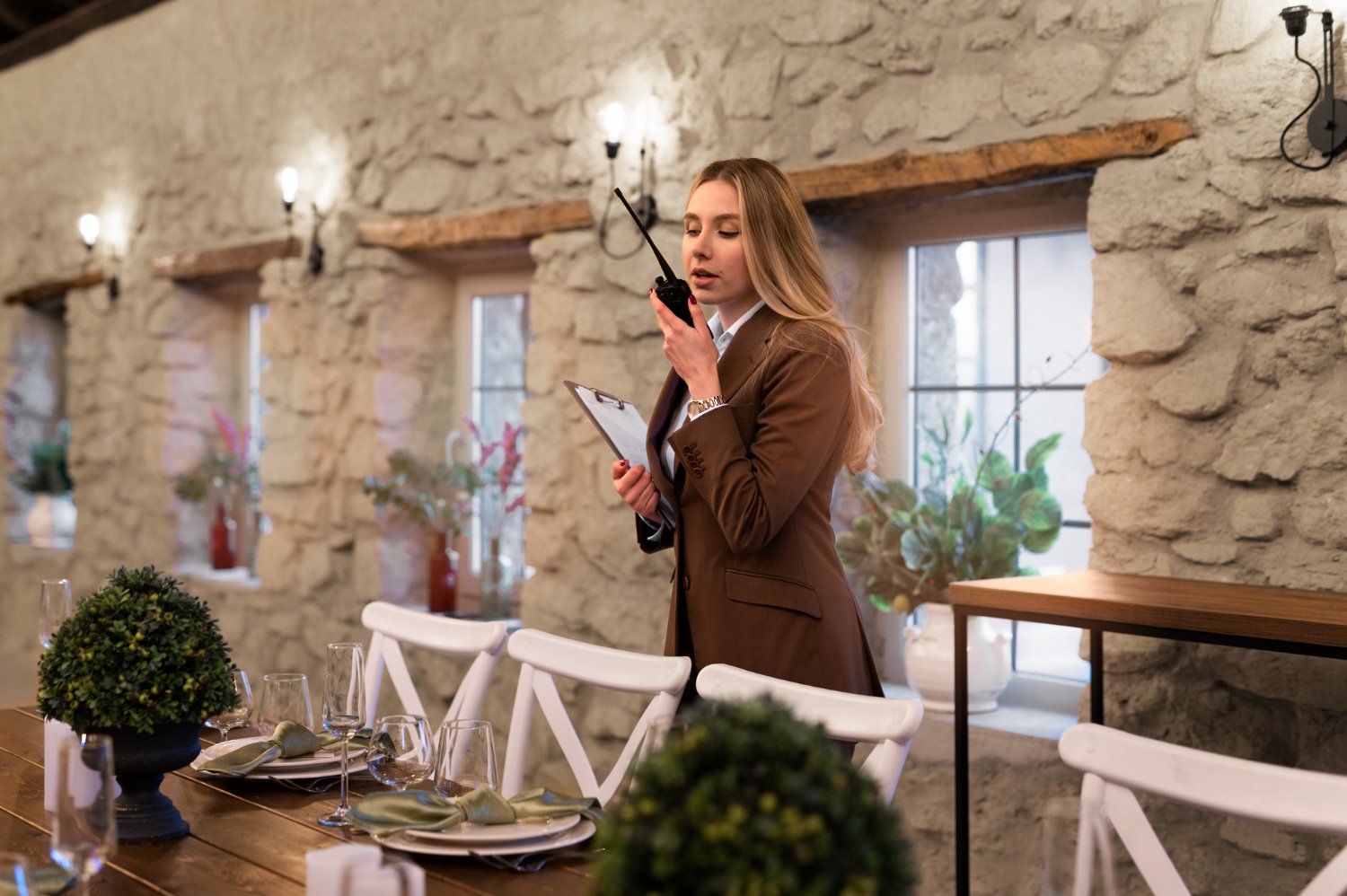
Qualities of a Good Wedding Hostess
A good wedding hostess needs a few key qualities to create an amazing experience for guests. Firstly, strong communication skills are key to talking with guests and wedding staff and dealing with any queries. Secondly, organization and attention to detail are essential for making sure everything runs smoothly. Thirdly, a warm welcome is necessary to set the tone. Fourthly, it's important to stay calm under pressure. Finally, professionalism and privacy are both key.
Unique details also matter. For instance, a hostess must know wedding traditions and etiquette to help guests. They should also keep guests informed about the schedule and venue layout. Adaptability helps too - the hostess should be able to handle changes with grace.
A WeddingWire survey found that 87% of guests think a good hostess makes their experience better. It's clear how important this role is.
Pre-Wedding Responsibilities of a Wedding Hostess
A wedding hostess plays a crucial role in ensuring the smooth running of pre-wedding events. From coordinating pre-wedding festivities to assisting with the rehearsal dinner, they handle key responsibilities. With an eye for detail and impeccable organizational skills, they bring the wedding vision to life.
Let's explore the vital pre-wedding tasks that a wedding hostess undertakes, ensuring an unforgettable experience for all involved.
Coordinating Pre-Wedding Festivities
The wedding hostess has a crucial role in coordinating pre-wedding festivities. They meet with the couple to discuss their vision and preferences and help select themes, decorations, and other special elements.
Logistical tasks such as scheduling, invitations, and vendor coordination are handled by the hostess. They also manage RSVPs and the guest list for each event.
The hostess ensures all pre-wedding events align with the couple's overall vision. They are present at these gatherings to oversee their smooth execution and provide assistance where necessary. Additionally, they take care of the Rehearsal Dinner - making sure the menu suits the bride and the groom doesn't toast his speech too much!
Assisting with the Rehearsal Dinner
A wedding hostess's job goes beyond the wedding day. They are responsible for aiding the rehearsal dinner—an integral part of the wedding. This requires meticulous planning and support.
- Organizing: Wedding hostesses coordinate the logistics for the rehearsal dinner. RSVPs, transportation, seating...they make sure everything runs smoothly.
- Creating a Welcoming Space: Hostesses help decorate the venue, making it inviting for guests. Also, they check that table settings and decorations are in order.
- Managing Guests: During the dinner, the hostess greets attendees, creates seating plans and handles any last-minute questions.
Attending to the rehearsal dinner is a crucial part of the hostess's job. They strive to make the event special, setting a positive tone for the wedding celebration.
68% of couples had a rehearsal dinner before their wedding ceremony (WeddingWire's 2020 Newlywed Report).
Responsibilities on the Wedding Day
On the wedding day, the hostess takes on various responsibilities to ensure a smooth and memorable event. From greeting and welcoming guests to assisting with set up and serving, their attention to detail is crucial. Additionally, they play a vital role in ensuring the conversation is flowing and that everyone feels included. With these key tasks at hand, the hostess plays an integral part in creating a positive and enjoyable atmosphere for all wedding attendees.
Greeting and Welcoming Guests
A wedding hostess has a big role in making guests feel welcomed and valued. She greets each guest with a smile and kind words as they come to the venue. The hostess provides directions and helps with any questions or concerns. She also shares info about the event such as when the ceremony will start or where to find restrooms.
Furthermore, the hostess is responsible for collecting gifts, managing the guest book, assisting with reception duties, and making conversation smooth. Her warmth and professionalism make an excellent first impression and set the tone for the wedding. This way, guests feel valued and appreciated.
Assisting with Set Up and Serving
A wedding hostess has an important responsibility to assist with setting up and serving at a wedding. They play a big role in making sure the reception runs smoothly and all guests are taken care of. Here is a 5-step guide to help with set up and serving:
- Communicate with event planner: The hostess should talk with the event planner to understand where tables, chairs, and decorations need to go.
- Put out chairs and tables: Organize the chairs and tables according to the seating plan. Make sure each guest has a spot and enough room to be comfortable.
- Set the table: Put out plates, glasses, silverware, and napkins. Ensure each table is properly set before anyone arrives.
- Serve food and drinks: During the reception, the hostess helps bring out trays of appetizers or assists waitstaff in delivering plates to guests' tables.
- Attend to guests: The hostess should take care of guests' needs during the reception. This includes refilling water glasses, answering questions, or helping if any issues come up.
It's important for a wedding hostess to be professional throughout their duties. By assisting with set up and serving, they contribute to a great experience for everyone at the wedding.
Ensuring Conversation Flowing
A wedding hostess is vital for conversation to run smoothly during the wedding. It's their job to help guests interact and create a fun environment.
They can place guests at tables where they have common interests or connections, to get conversations started. They can also break the ice by introducing guests to one another.
The hostess can organize activities or games that get guests talking. This can include quizzes, icebreaker questions, or dance-offs. This way, everyone feels involved in the celebration.
The hostess must be alert and attentive to any awkward silences. They can step in by beginning a new topic of discussion or changing the conversation. Their goal is to keep the atmosphere lively.
Post-Ceremony Responsibilities of a Wedding Hostess
After the ceremony, a wedding hostess has several important responsibilities to ensure a seamless transition. From breaking down and cleaning up to closing duties, let's explore the post-ceremony tasks of a wedding hostess. With attention to detail and efficiency, these crucial duties contribute to the overall success and smooth running of the event.
Breaking Down and Cleaning Up
Breaking down and cleaning up after a wedding is made easy with this 6-step guide!
- Step 1: Remove Decorations. Take out flowers, centerpieces, drapery and lighting fixtures with care.
- Step 2: Gather Rentals. Collect rented tables, chairs, linens and any other equipment used during the ceremony or reception. Make sure to clean them before returning.
- Step 3: Pack up Gifts. It's the hostess' job to collect gifts and label them with names or tags.
- Step 4: Clean Up Tables and Surfaces. Wipe down tables, remove spills or stains and clear any leftover food.
- Step 5: Dispose of Waste. Work with venue staff to empty trash bins regularly.
- Step 6: Final Inspection. Make sure all areas are cleaned up properly. Check for anything that might need more attention.
Communicate with other crew members too! Attention to detail and good organization skills are key.
Crying into the cake? Not a duty - but totally understandable!
Closing Duties
The wedding hostess is responsible for all closing duties, to ensure everything wraps up smoothly. These duties include:
- Breaking down and cleaning up the event space
- Finalizing any paperwork or payments
- Returning items to their proper places
- Packing up gifts
- Closing off areas
- Coordinating transportation
- Plus, any other miscellaneous tasks that may arise
Efficiency and attention to detail is key, so the couple and their loved ones can relax and enjoy the rest of their special day. According to WeddingWire.com, a wedding hostess can alleviate stress for the couple and their families.
Dress Code and Appearance Tips for a Wedding Hostess
A wedding hostess is vital for an event's success. Specific dress code guidelines should be followed for a polished look. To create the desired atmosphere, one must understand these tips.
- Attire: Formal or semi-formal clothing is typical. Opt for a tailored suit or dress in classic colors - white should be avoided, as it is traditionally for the bride.
- Accessories: Choose pieces that match the theme. A tasteful necklace or earrings can add sophistication. Keep it simple - no excessive or flashy items.
- Hair and Makeup: Hair and makeup should be neat and suitable for the occasion. Opt for a polished yet easy-to-maintain style. Natural makeup is best - no overdoing it.
- Shoes: Comfortable and stylish shoes are essential. Avoid high heels that are uncomfortable, as you'll be on your feet for some time.
It's important to check with the couple or wedding organizer for any special requests. Amy, a wedding hostess, learned this the hard way. At a wedding, she wore an elaborate dress with flashy accessories. This clashed with the ambiance and took focus away from the couple. She realized the importance of dressing appropriately and always follows the above tips, as this can make a big impact on the wedding experience.
Number of Hostesses Needed Based on Wedding Size
When planning a wedding, it's important to consider the scale and complexity of the event. Different wedding sizes require different levels of assistance. A table can be created to outline the number of hostesses needed based on various wedding sizes. It can help event planners to determine the right number of hostesses. Factors such as the number of guests, venue layout, and desired guest service must be taken into account.
Unique details must also be addressed. This includes additional hostesses for bigger venues or multiple locations. By paying attention to these, event planners can ensure that all guests are taken care of.
To make the wedding experience memorable and flawless, it's necessary to hire enough hostesses. Couples can rest assured that their guests will receive personal attention and assistance. Don't miss out on the chance to make lasting memories and an outstanding wedding celebration!
Conclusion
A hostess is essential at a wedding. They welcome guests, guide them to their seats, and attend to their needs. Hostesses coordinate with vendors, organize seating arrangements, and make sure everything goes to plan. They work closely with the wedding planner and other staff to create a warm, welcoming atmosphere. Hostesses serve drinks and food, ensuring all guests are taken care of. Their role is invaluable in creating a positive and enjoyable experience for everyone attending. The hostess's contribution to a wedding is essential to making it a successful and memorable event.
Some Facts About What a Hostess Does at a Wedding:
- ✅ A hostess at a wedding is responsible for welcoming guests to all wedding functions and ensuring they sign the guest book. (Source: Team Research)
- ✅ The hostess also directs guests to their seats and the buffet, and manages the gift table. (Source: Team Research)
- ✅ Additional duties of a hostess may include transporting gifts, paying the band, decorating the rehearsal dinner, and managing reception details. (Source: Team Research)
- ✅ A good hostess ensures that everything the bride has dreamed of is ready before the guests arrive at the reception venue. (Source: Team Research)
- ✅ The role of a hostess can also include taking on the responsibilities of a bridesmaid and assisting with pre-wedding festivities. (Source: Spasifik Mag)
FAQs about What Does A Hostess Do At A Wedding
What are the duties of a hostess at a wedding?
A hostess at a wedding has several responsibilities, including greeting and welcoming guests, assisting with inquiries and the flow of the program, and helping with the overall coordination of the event. They may also take on the role of a bridesmaid and assist with pre-wedding festivities.
How many hostesses are needed for a wedding?
The number of hostesses needed for a wedding can vary depending on the size of the event. For smaller weddings, one or two hostesses may be sufficient, while larger weddings may require eight or more hostesses.
What should a hostess wear at a wedding?
A wedding hostess should wear attire that is both comfortable and stylish, taking into consideration the formality of the event and the time of day. It is also recommended for the hostess to match the bridal party's colors.
What are the responsibilities of the groom's parents at a wedding?
The responsibilities of the groom's parents at a wedding may include paying for the marriage license, ceremony, and providing various necessary items. They may also be included on the wedding invitation as a gesture of appreciation.
What does a hostess do at a bridal shower?
At a bridal shower, the hostess takes on additional responsibilities such as planning games and activities, collecting gifts, and helping the bride open her gifts. The hostess should also greet guests, mingle with attendees, and sit next to the bride during gift opening.
How can a hostess make guests feel welcome at a wedding?
A hostess can make guests feel welcome by greeting and welcoming them, answering any questions they may have, assisting with their seating arrangements, and ensuring their overall comfort throughout the event. Making guests feel welcomed and taken care of is an essential part of a hostess's role at a wedding.
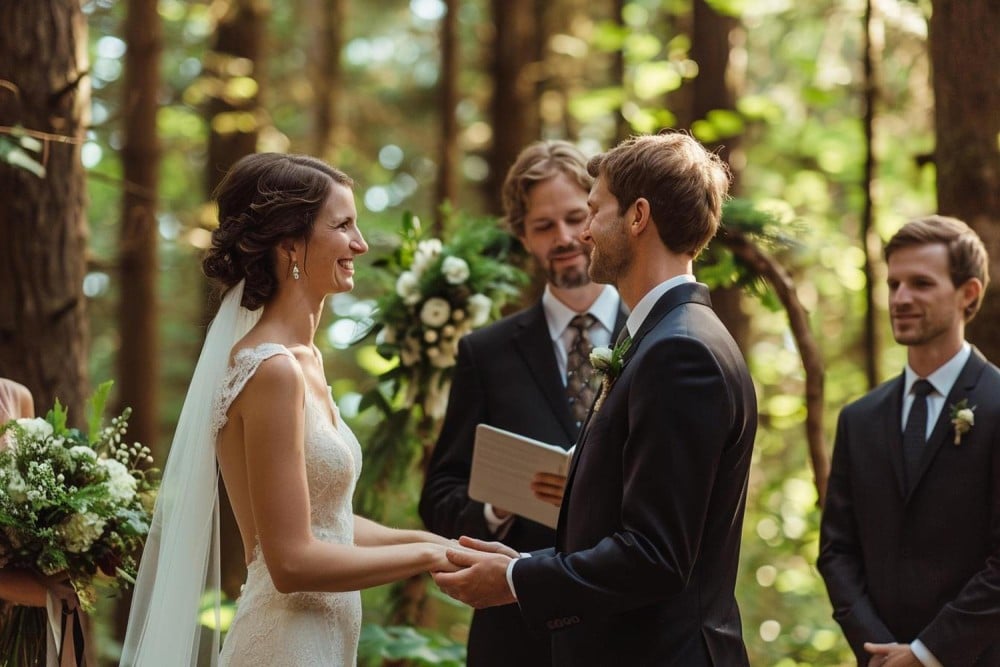 How to become a wedding officiant in tennessee ?Read more
How to become a wedding officiant in tennessee ?Read more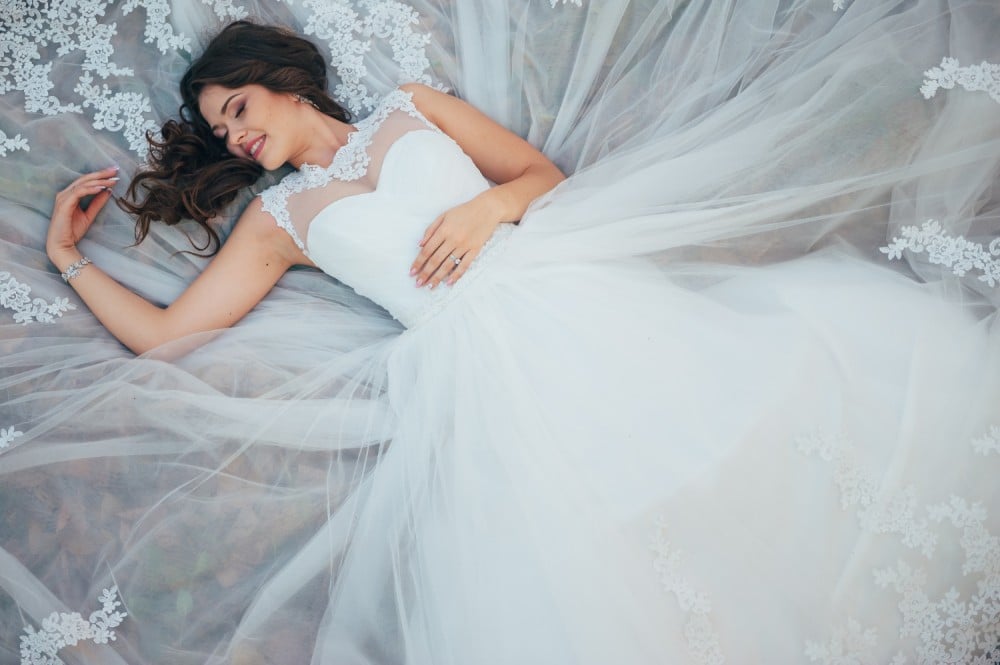 How to bustle a tulle wedding dress ?05/21/2024Posted in: Wedding Fashion & StyleRead more
How to bustle a tulle wedding dress ?05/21/2024Posted in: Wedding Fashion & StyleRead more Planning Your Honeymoon Tips for an Unforgettable Trip05/20/2024Posted in: Wedding PreparationsRead more
Planning Your Honeymoon Tips for an Unforgettable Trip05/20/2024Posted in: Wedding PreparationsRead more The Dos and Donts of Wedding Guest Etiquette05/16/2024Posted in: Wedding Traditions & EtiquetteRead more
The Dos and Donts of Wedding Guest Etiquette05/16/2024Posted in: Wedding Traditions & EtiquetteRead more The Importance of PreWedding Counseling What You Should Know05/13/2024Posted in: Wedding PreparationsRead more
The Importance of PreWedding Counseling What You Should Know05/13/2024Posted in: Wedding PreparationsRead more Can I wear beige to a wedding ?11/14/2023Posted in: Wedding Fashion & StyleOne of the most common questions when it comes to wedding guest attire is whether it's appropriate to wear beige to a...Read more
Can I wear beige to a wedding ?11/14/2023Posted in: Wedding Fashion & StyleOne of the most common questions when it comes to wedding guest attire is whether it's appropriate to wear beige to a...Read more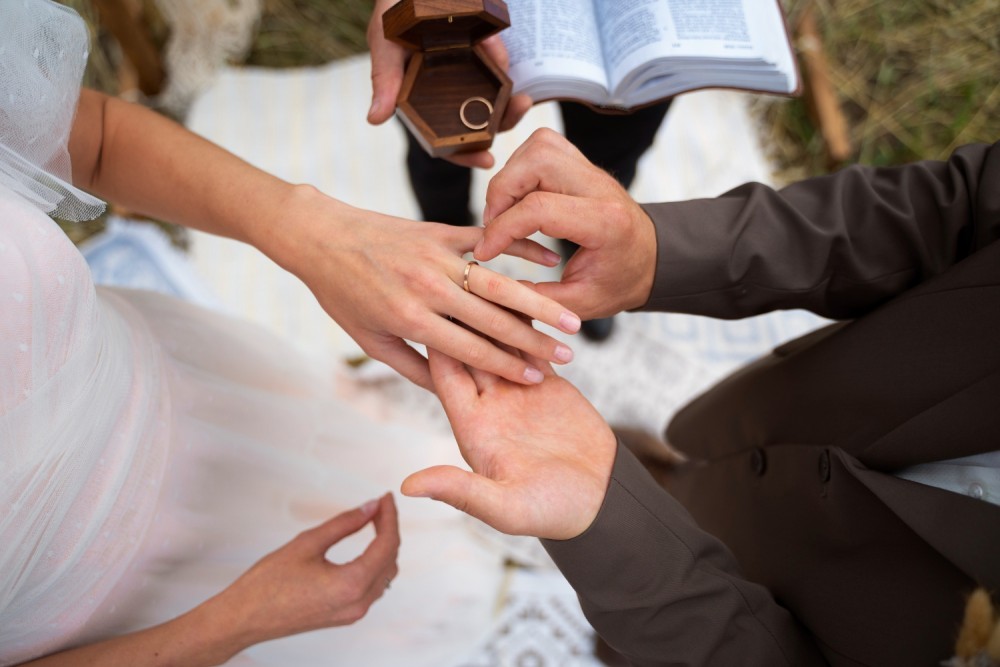 Do Jehovah Witnesses celebrate weddings ?02/29/2024Posted in: Wedding Traditions & EtiquetteJehovah’s Witnesses are known for their distinctive beliefs and practices, but what about weddings? In this...Read more
Do Jehovah Witnesses celebrate weddings ?02/29/2024Posted in: Wedding Traditions & EtiquetteJehovah’s Witnesses are known for their distinctive beliefs and practices, but what about weddings? In this...Read more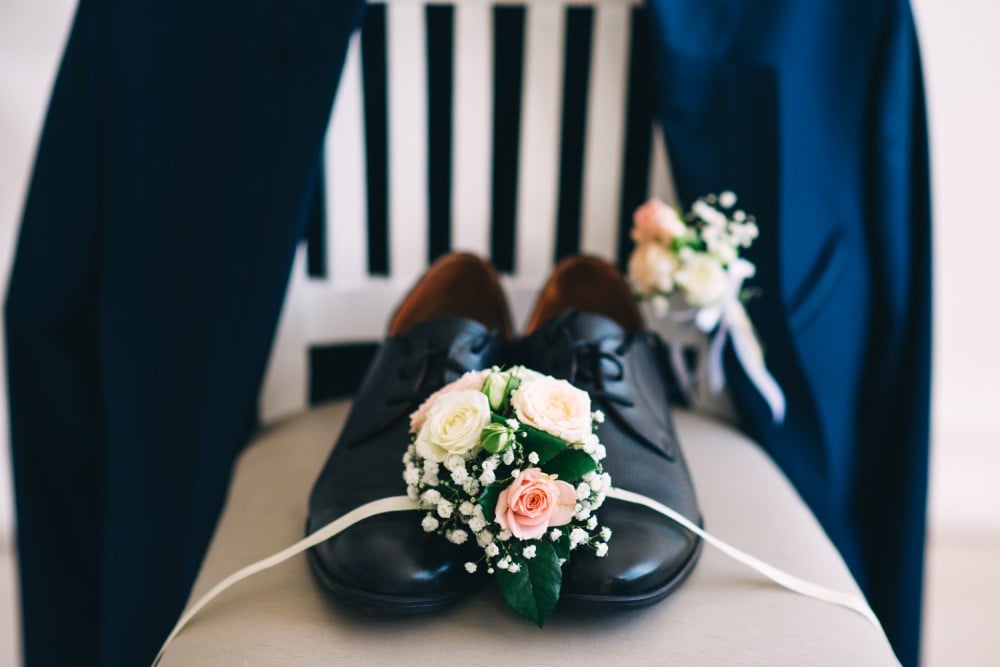 What color shoes with navy dress for Wedding ?08/20/2023Posted in: Wedding Fashion & StyleMatching shoe color with navy dress When teaming shoe color with a navy dress, it's essential to decide on a hue...Read more
What color shoes with navy dress for Wedding ?08/20/2023Posted in: Wedding Fashion & StyleMatching shoe color with navy dress When teaming shoe color with a navy dress, it's essential to decide on a hue...Read more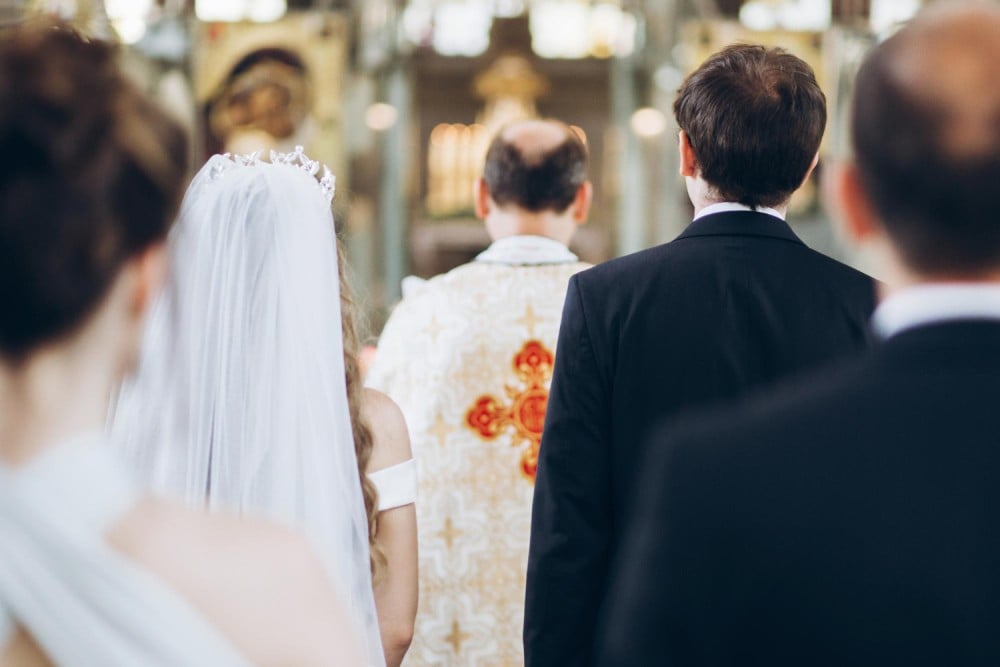 What to wear to a Church Wedding ?09/04/2023Posted in: Wedding Fashion & StyleAre you attending a church wedding and unsure about the dress code? Our latest article provides a deep dive into the...Read more
What to wear to a Church Wedding ?09/04/2023Posted in: Wedding Fashion & StyleAre you attending a church wedding and unsure about the dress code? Our latest article provides a deep dive into the...Read more What does a black wedding ring mean ?06/12/2023Posted in: Miscellaneous Wedding AspectsWedding rings are a traditional symbol of love and commitment, but their style and design can vary greatly. In recent...Read more
What does a black wedding ring mean ?06/12/2023Posted in: Miscellaneous Wedding AspectsWedding rings are a traditional symbol of love and commitment, but their style and design can vary greatly. In recent...Read more How to become a wedding officiant in tennessee ?06/27/2024Looking to become a wedding officiant in Tennessee but not sure where to start? This comprehensive guide will walk...Read more
How to become a wedding officiant in tennessee ?06/27/2024Looking to become a wedding officiant in Tennessee but not sure where to start? This comprehensive guide will walk...Read more How to bustle a tulle wedding dress ?05/21/2024Posted in: Wedding Fashion & StyleAre you a bride-to-be with a tulle wedding dress and wondering how to bustle it for the big day? Look no further!...Read more
How to bustle a tulle wedding dress ?05/21/2024Posted in: Wedding Fashion & StyleAre you a bride-to-be with a tulle wedding dress and wondering how to bustle it for the big day? Look no further!...Read more Planning Your Honeymoon Tips for an Unforgettable Trip05/20/2024Posted in: Wedding PreparationsPlanning your honeymoon is an exciting and important step in beginning your life together as a married couple. From...Read more
Planning Your Honeymoon Tips for an Unforgettable Trip05/20/2024Posted in: Wedding PreparationsPlanning your honeymoon is an exciting and important step in beginning your life together as a married couple. From...Read more The Dos and Donts of Wedding Guest Etiquette05/16/2024Posted in: Wedding Traditions & EtiquettePlanning to attend a wedding soon? Make sure you brush up on your wedding guest etiquette to ensure you have a great...Read more
The Dos and Donts of Wedding Guest Etiquette05/16/2024Posted in: Wedding Traditions & EtiquettePlanning to attend a wedding soon? Make sure you brush up on your wedding guest etiquette to ensure you have a great...Read more The Importance of PreWedding Counseling What You Should Know05/13/2024Posted in: Wedding PreparationsAre you and your partner considering pre-marriage counseling but not sure what to expect? This article is here to...Read more
The Importance of PreWedding Counseling What You Should Know05/13/2024Posted in: Wedding PreparationsAre you and your partner considering pre-marriage counseling but not sure what to expect? This article is here to...Read more











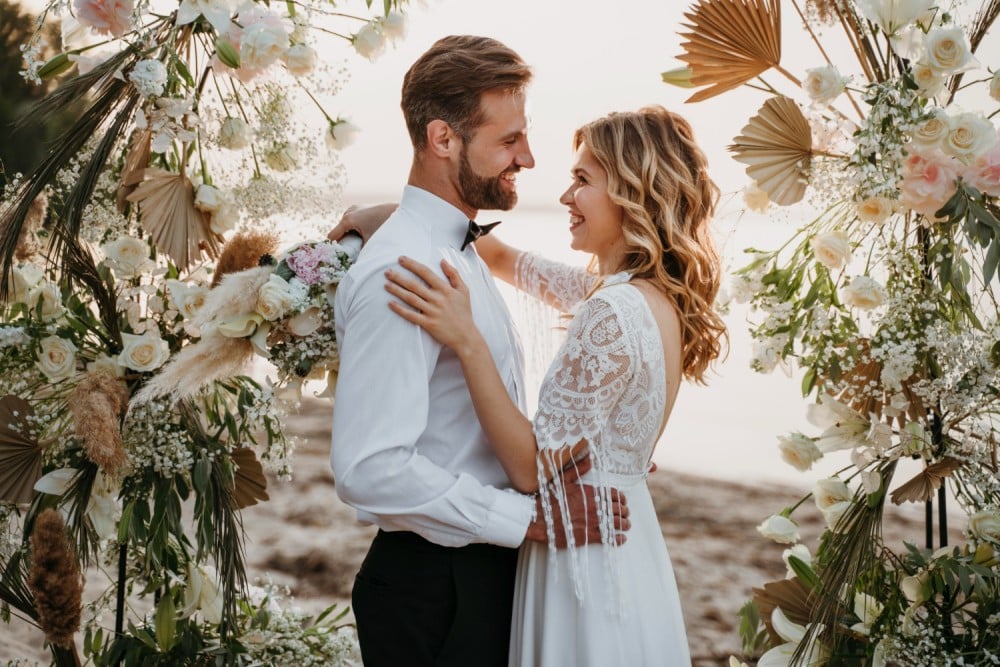
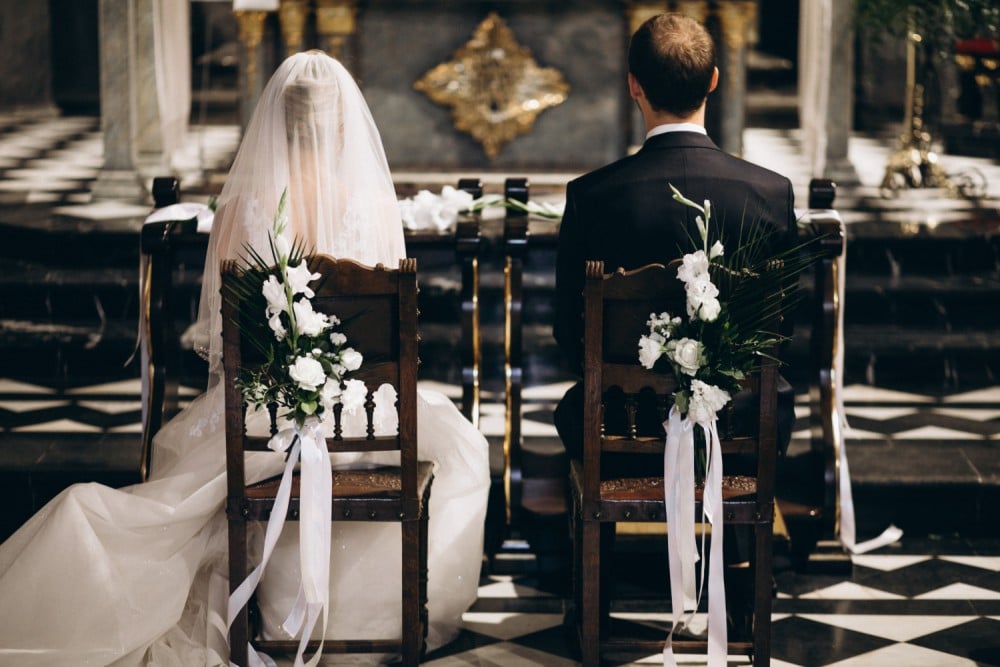
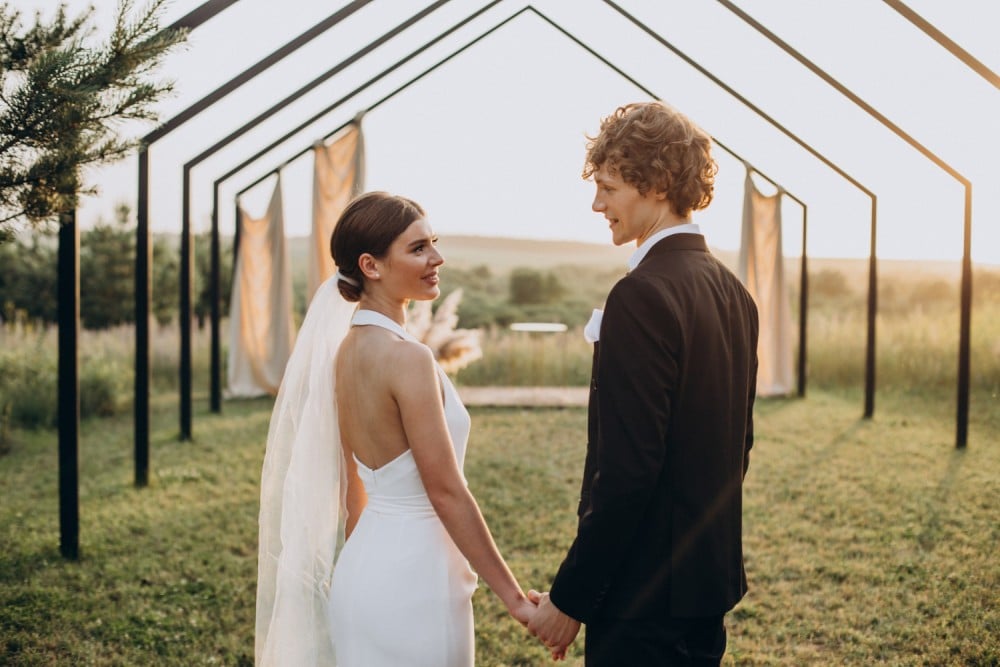
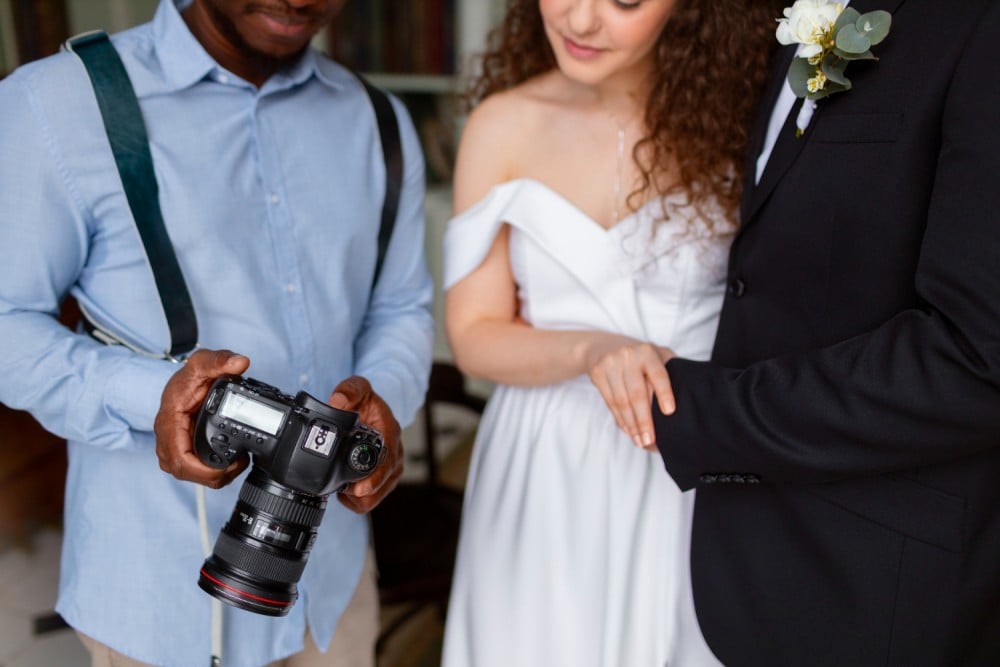

Top authors